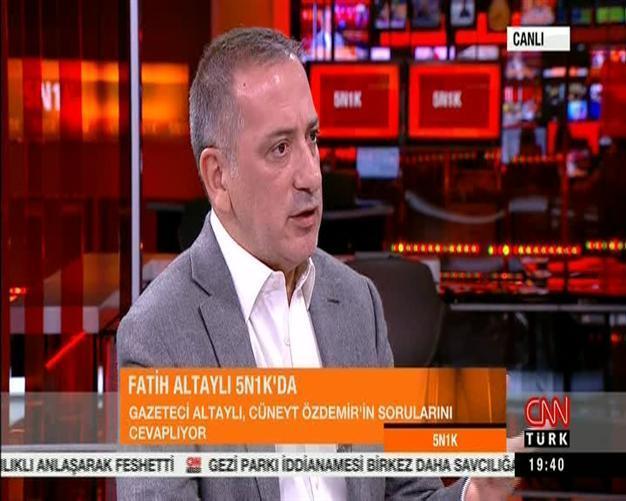‘Instructions rain down on Turkish media every day,’ says prominent editor-in-chief
ISTANBUL

Veteran journalist, daily Habertürk editor Fatih Altaylı, also came under fire after his interview with PM Erdoğan during the first days of the Gezi Park protests last summer. DHA photo
The editor-in-chief of a widely circulated mainstream Turkish newspaper has publicly claimed to be under constant political pressure, in response to an alleged phone transcript in which the prime minister gave orders to an executive of a broadcaster owned by the same media group.“Today, the dignity of journalism is being trampled underfoot. Every day, instructions rain down from somewhere,” daily Habertürk Editor-in-Chief Fatih Altaylı said during an interview with private broadcaster CNNTürk Feb. 10, acknowledging that he has been used by the government.
Without denying the authenticity of the recording, Altaylı described it as a development that “showed for the first time the pressure on the media in a [more concrete way].” He also added that his media group was far from being the only group that was being subjected to pressure.
“Everyone is scared. This is the concrete proof of something that was said to exist. It revealed what has been always known. It’s like [Neil] Armstrong walking on the moon,” Altaylı said.
Owned by Ciner Holding, which is active in a broad range of businesses from energy to mining, most of which require government contracts, both daily Habertürk and Habertürk TV rank among the biggest mainstream media outlets.
Along with his daily’s editor-in-chief position, Altaylı also presents news programs on Habertürk TV. He was the first to interview Prime Minister Recep Tayyip Erdoğan on the nationwide Gezi resistance during the first days of the turmoil last summer, in an interview which became infamous as the prime minister referred to the protesters as “marauders” (çapulcu). The protesters then adopted the slur as a badge of honor, even coining the English-sounding verb “Chapulling” to describe their resistance in defense of their rights.
Three journalists fired on request
Altaylı also revealed that three journalists had been fired from his daily due to a headline of an article on health policy and upon the intervention of the aforementioned executive, Fatih Saraç, who was recently shown to be supplicating to Erdoğan when the prime minister called to complain about news coverage, according to a conversation that was recently leaked onto the Internet.
Recalling that the headline of the article stated “Is this the Turkey which has stepped into a new age in health?” Altaylı said he tried to defend his editors.
“I said: ‘There can be no ill will in us. Our friends put this headline to make the article [flow].’ I called the Health Ministry and told them not to perceive this as a conspiracy. I didn’t fire [the journalists] myself, but they were subsequently dismissed by higher authorities,” Altaylı said.
Opinion poll manipulation claims
Altaylı, however, denied the authenticity of another leaked phone record between himself, Saraç and Bilal Erdoğan, the son of the prime minister, which also spread on social media last week. The recordings appeared to reveal an agreement between the three about altering the results of an opinion poll conducted in March 2013. Altaylı, nevertheless, did not deny the request, even adding that he attempted to resist against it.
“The record is the skillful montage of three separate conversations that I had that day with Fatih Saraç. This part is true: I actually said that I will talk about [redistributing] the ratio of undecided voters,” Altaylı said.
“You say on the phone ‘yeah, yeah.’ I resisted, then I did not alter the poll and put it as it is. Because if I had made the changes, I would stop doing journalism,” he said.
Turkey’s mainstream media came under particular fire during last year’s Gezi Park resistance for failing to broadcast stark police violence, especially in the heart of Istanbul and Ankara, choosing instead to air documentaries about penguins. Many Turks subsequently turned to foreign broadcasters like CNN and the BBC, as they broadcast live from the scene of the events.
















